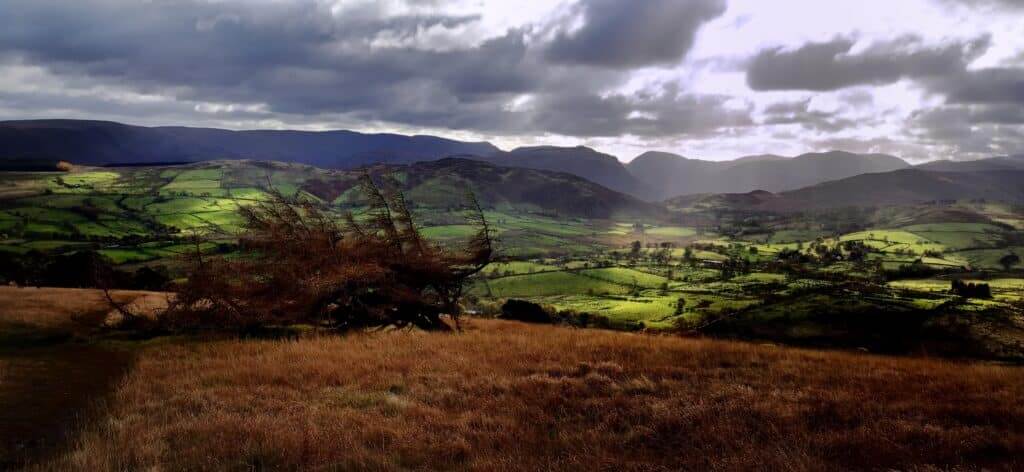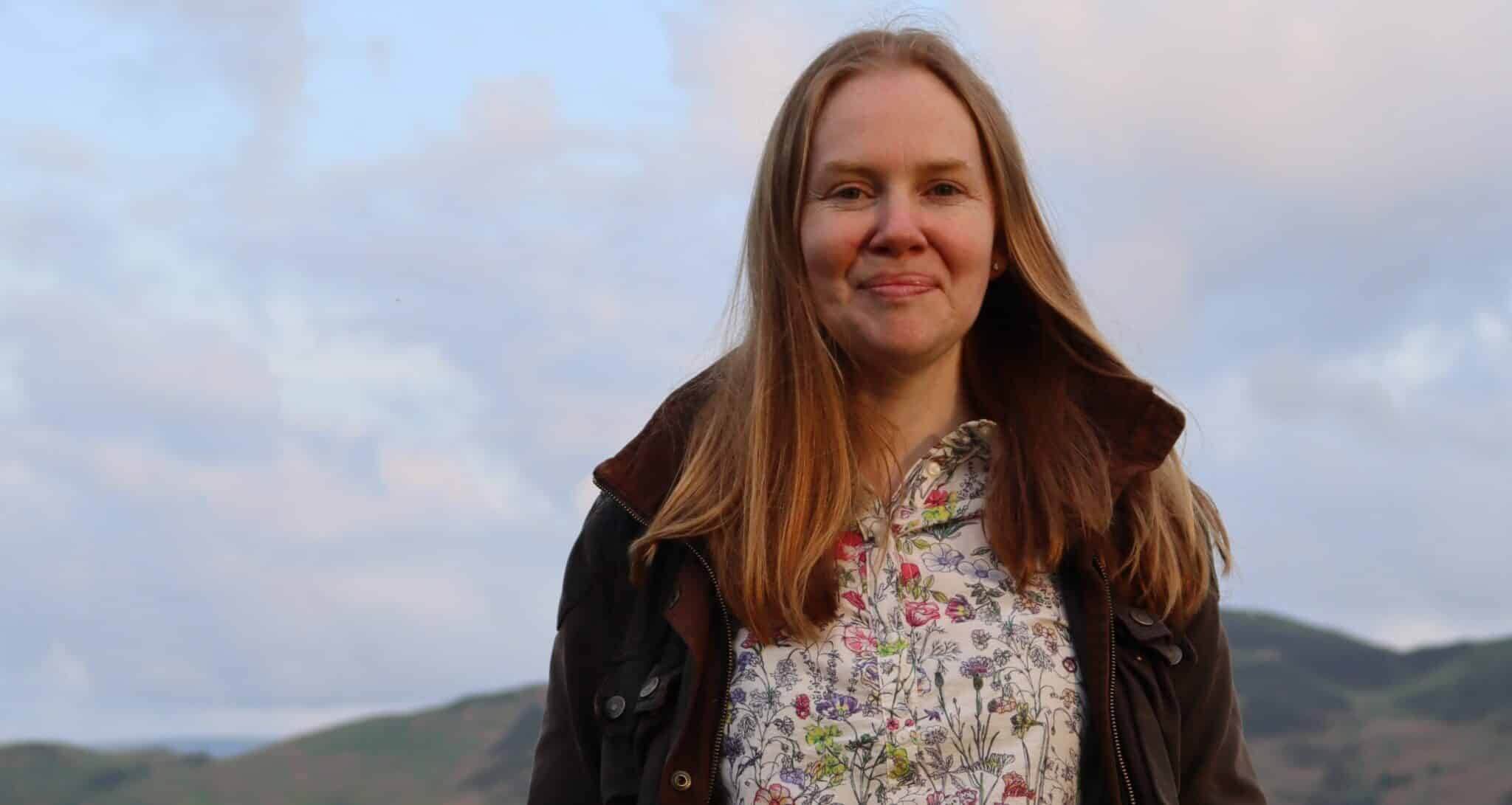Helen Rebanks is perhaps an unlikely food and farming hero as she sits in the homely kitchen of her upland Lakeland farm in Matterdale. Her husband James Rebanks of English Pastoral book fame is shouldering a coat as he scarpers out the back door. I am surprised she has time to speak to me about her debut book, a candid epistle entitled The Farmer’s Wife.
We’ve got Covid lockdown to thank for giving Rebanks a little more headspace away from the 500 sheep, 20 chickens, 50 cattle, six sheepdogs, two ponies and four children they care for. Her story started off as a mum’s cookbook for her offspring with recipes for marmalade and custard. But it soon morphed into something more than menus and light stories.
It’s fair to say this book has become something of a memoir, both specific to Rebanks and universal to thousands of farming families across the UK. It has tales about women and the ‘glue’ that they still represent in many farms across Britain. But also discusses deeper issues around our capitalist culture of sustainability, as well as celebrating the strength of individuals, families and communities.
“The focus is the family kitchen table,” she tells me. “What I am trying to do is connect who is doing the cooking with where our food is coming from. This includes good family and traditional mixed farms, eating well-sourced produce and championing British provenance. It’s also about the choices I’ve made to be a stay-at-home mum.”
Over the last few years her husband has been in the spotlight with his best-selling tomes such as The Shephard’s Life and English Pastoral highlighting the challenges faced by upland farms in the Lake District and the need to shift to more sustainable land use. Recently, Rebanks felt it was her turn to have a public voice on issues close to her heart.
The question is – what’s my contribution to the conversation in society about what we’re eating, how we’re living?
“I’ve been there every step of the way with James, and it’s been a team effort. The public may not realise that since he’s the writer. Yet we’ve been on a journey together with this farm and the challenges we’ve faced deal with the changing face of agriculture in the last couple of decades. We’ve both been heavily involved in adopting regenerative farming practices,” she explains.
“The question is – what’s my contribution to the conversation in society about what we’re eating, how we’re living? That’s what the book is about. But I’m not trying to preach. I’m storytelling.”
Empowerment through food choices
Her family are all keen on good food, her eldest daughter is training to be a chef and another has a keen interest in raising livestock. Rebanks speaks of how her family’s life has revolved around food and the kitchen, as well as feeding workers on the farm. She reads me a passage from the book and her choice is an interesting one, on climate change and how we can all be part of that conversation. And that if you’re responsible for family meals, you have a huge part to play as the weekly shop and the food we choose can make a real difference.
The issue is that cooking at home is given such low standing. I’m now on a mission to raise its status.
“I think cooking, shopping and eating; it’s curiously political,” she explains. “It’s powerful, it’s radical and it’s vitally important for the children we raise, in terms of what they experience around the dining table. There’s also a deep connection between our food and the land – or should be. The issue is that cooking at home is given such low standing. I’m now on a mission to raise its status,” she states.
It is not surprising she is big on food provenance. The beef she cooks is from their own herd of Belted Galloway cows and Herdwick Hogget, a local Cumbrian breed of young sheep. This interest in origin also extends to fruit and veg.

“My grandmother used to go up to Scotland every year to make a pilgrimage for the raspberry season to make our own jam,” she recalls. “She came back with a car full, and it was just wonderful. I grew up with that and tasting that fruit the other day took me right back. I want my kids to grow up knowing what’s in season and when it’s in season.
“So many things could be so much better and healthier leading to a happier population. We’ve been led down this path of highly processed, highly palatable food full of salt and sugar. Ready, quick, easy food and it’s just killing us.”
Reclaiming the role
I wonder why she decided to call her debut book The Farmer’s Wife? It feels perhaps like an outdated lens through which to focus, in an age when a lot of people feel partnerships in farming families have evolved to become more equal.
I’ve been made to feel like dirt several times in my life by people saying, ‘oh well you’re just the farmer’s wife’. What I’m trying to do is reclaim this role.
“I’m saying let’s have a look at under the surface of this role. This invisible, unpaid role,” she tells me. “I’ve been made to feel like dirt several times in my life by people saying, ‘oh well you’re just the farmer’s wife.’ What I’m trying to do is reclaim this role. I am saying it is one of the most rewarding ways to live a life and I’m proud to be a farmer’s wife.
“If we focus on women in the media that are now doing jobs that are traditionally done by men, that is all well and good, that’s really shifting the balance where these roles that have been dominated by men in the past. But then we’re completely dismissing and ignoring a whole history of women’s work and lives. It is not just historical; there’s quite a lot of women still living out this role. I’m doing this for all the other quiet lives of women out there that are well lived,” she adds.
Rebanks’ views also range beyond the remit of the book when it comes to food and farming. She believes there is a lot that needs to change in how we farm and she’s particularly excited about regenerative farming and the changes it will bring.
What food we buy, cooking it and eating, it’s hugely important. It can literally change the world, if we do it well.
“As farmers we’ve had to recognise what we did things badly in the past, and what we can do better once we learn about soil health, and biodiversity loss. I think when you know better, you can do better. But it’s extremely hard because farmers aren’t supported financially to do better. The uplands are being completely neglected by current government policy,” she says.
“We can’t keep putting synthetic fertiliser and spraying everything with pesticides. It’s killing the land. We’ll just have nothing left to eat.”
With the optimism and quiet confidence that is resonant throughout her book, she summarises: “What food we buy, cooking it and eating, it’s hugely important. It can literally change the world, if we do it well. We have to remain hopeful, don’t we?”
The Farmer’s Wife: My Life in Days by Helen Rebanks (Faber & Faber, £20) is available from 31 August.









I shall buy a copy of Helen’s book and another for my 95 year old mum (also a farmers wife) and look forward to reading it. I’ve posted here before about how wonderful James Rebanks English Pastoral is. If you’ve not read it then you must, I fear time is short. Thank you James and Helen and Riverford for being beacons of sustainability.
Wonderful to hear, we hope she enjoys it.